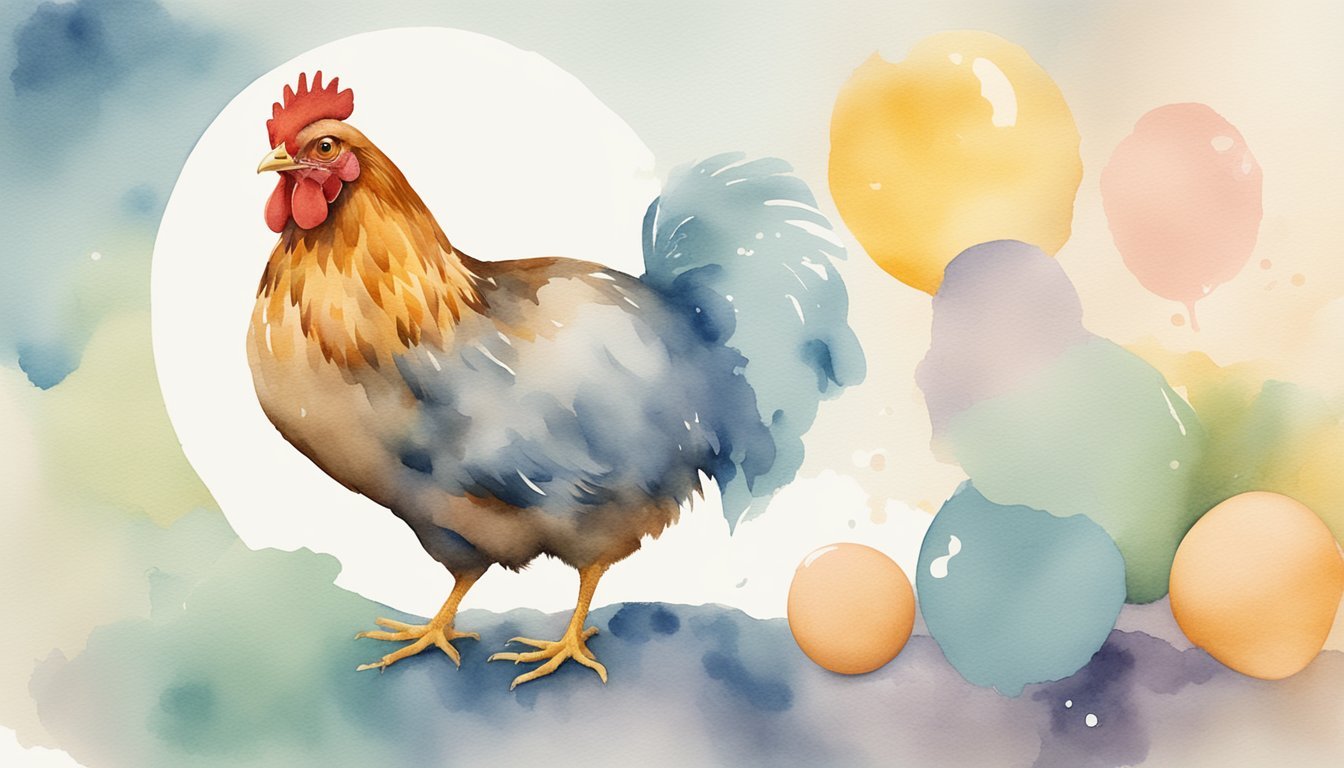Origins and Evolutionary Biology
From Reptiles to Birds
The story of the chicken and the egg can be traced back to the evolutionary process that led from reptiles to birds. Around 340 million years ago, amniotes─a group of animals that include reptiles, mammals, and birds─began to lay amniotic eggs. These eggs have unique membranes like the chorion, allantois, and amnion, which provide a safe environment for the embryo to develop outside of water. Before the evolution of amniotic eggs, the ancestors of these creatures─amphibians─needed aquatic environments for reproduction.
Fossil records show that dinosaur eggs are around 190 million years old, predating the existence of modern birds. In fact, the oldest known bird, Archaeopteryx, emerged over 150 million years ago. This establishes that eggs existed long before the first chicken.
Domestication of the Chicken
Chickens are a subspecies of jungle birds known as Gallus gallus, specifically Gallus gallus domesticus. The domestication process started over 58,000 years ago, as red junglefowl interbred with the Grey Junglefowl. This led to the development of the modern chicken, which has various unique features in its genetic makeup, such as yellow skin.
The domestication of the chicken was a result of humans selecting and breeding desirable traits in these birds. Over time, this process helped developing the distinctive Gallus gallus domesticus.
Genetics: DNA and Mutation
To understand which came first—the chicken or the egg—consider the role of DNA mutations in the evolution of species. When sexually reproducing organisms mate, their genetic material mixes, giving rise to offspring with a unique combination of genes. However, DNA mutations─some resulting from the natural error rate during replication─can lead to the emergence of new traits within a population.
At some point in the evolutionary history, a proto-chicken─an almost-chicken ancestor─produced an offspring with a genetic mutation that turned it into the first true chicken. This offspring developed within an egg laid by the proto-chicken. In this context, the chicken emerged from the egg, making the proto-chicken responsible for giving rise to the first true chicken egg. However, considering that eggs evolved over 325 million years ago, one could argue that eggs came first, as they existed way before the chicken.
In conclusion, the fascinating journey of chickens, eggs, and their evolutionary past offers important insights into speciation and genetic mutation. The intricate interrelationships among the chicken, its ancestors, and their eggs reflect the complexity and duality of the question that has been debated for centuries.
Philosophical and Conceptual Inquiry

The Ancient Paradox
The chicken or the egg question has been a subject of debate among thinkers from various fields for centuries. The ancient Greek philosopher Plutarch mentioned this paradox in his writings over 2,000 years ago, setting the stage for later philosophers such as Aristotle to build upon this puzzle. Aristotle introduced the ideas of potentiality and actuality, suggesting that the purpose of the egg is to become a chicken, making it a potential chicken, while the hatched chicken is the actual realization of that potential.
Modern Day Perspectives
In recent times, scientists and philosophers have continued to explore this question from different perspectives. While the causality dilemma may appear like a circular argument at first, breakthroughs in fields such as evolutionary biology and genetics have shed light on possible resolutions.
Modern birds, including chickens, evolved from small, carnivorous dinosaurs about 10,000 years ago in Southeast Asia. Intermediate species between birds and theropods, like Archaeopteryx, lived during this time and laid amniotic eggs, which contained an embryo surrounded by membranes and protein. This allowed certain dinosaurs to eventually develop into the chickens we know today.
The Causality Dilemma
From a scientific point of view, the formation of eggshells is a key aspect to consider when investigating the chicken and egg question. Eggshells are primarily made up of calcium carbonate, with a protein called ovocleidin-17 playing an essential role in their development. This protein is only found in chickens, which presents a strong case for the chicken coming first in this scenario.
However, the causality dilemma remains unsolved in philosophical circles, with brilliant minds such as Thomas Aquinas introducing concepts like infinite regress and the First Cause. More recently, figures like astrophysicist Neil deGrasse Tyson and science communicator Bill Nye have endorsed the position that the chicken came before the egg based on scientific evidence.
In conclusion, the chicken or the egg question has sparked numerous debates over the years, drawing on a multitude of scientific, philosophical, and historical aspects. Combining the knowledge from various disciplines may eventually provide us with a more definitive answer to this age-old inquiry.

